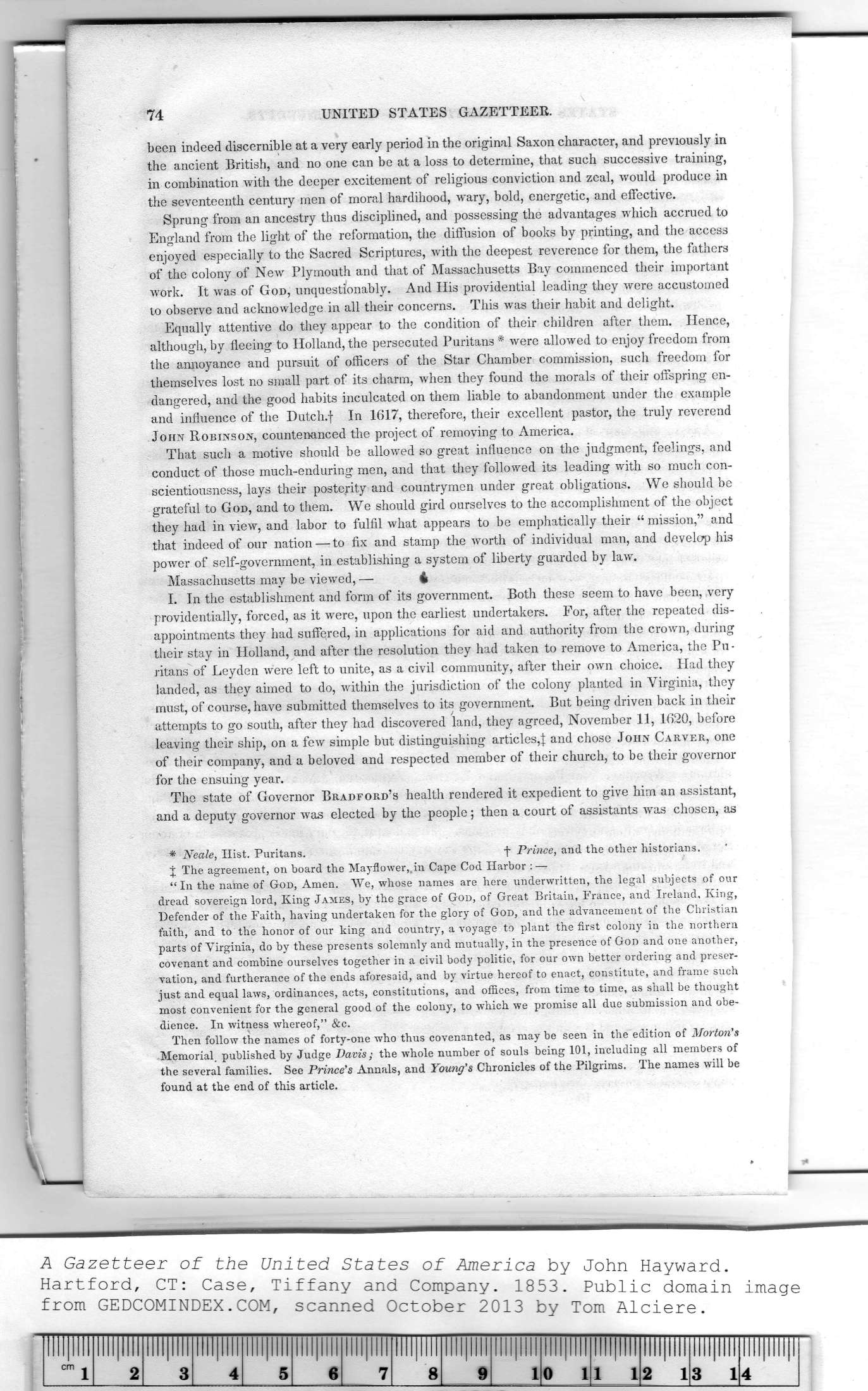|
|
Note: Ctrl and + increases the font size of the text below, Ctrl and - decreases it, and Ctrl and 0 resets it to default size.
74 UNITED STATES GAZETTEER.
been indeed discernible at a very early period in the original Saxon character, and previously in
the ancient British, and no one can be at a loss to determine, that such successive training,
in combination with the deeper excitement of religious conviction and zeal, would produce in
the seventeenth century men of moral hardihood, wary, bold, energetic, and effective.
Sprung from an ancestry thus disciplined, and possessing the advantages which accrued to
England from the light of the reformation, the diffusion of books by printing, and the access
enjoyed especially to the Sacred Scriptures, with the deepest reverence for them, the fathers
of the colony of New Plymouth and that of Massachusetts Bay commenced their important
work. It was of God, unquestionably. And His providential leading they were accustomed
to observe and acknowledge in all their concerns. This was their habit and delight.
Equally attentive do they appear to the condition of their children after them. Hence,
although, by fleeing to Holland, the persecuted Puritans 1 were allowed to enjoy freedom from
the annoyance and pursuit of officers of the Star Chamber commission, such freedom for
themselves lost no small part of its charm, when they found the morals of their offspring en-
dangered, and the good habits inculcated on them liable to abandonment under the example
and influence of the Dutch.f In 1617, therefore, their excellent pastor, the truly reverend
John Robinson, countenanced the project of removing to America.
That such a motive should be allowed so great influence on the judgment, feelings, and
conduct of those much-enduring men, and that they followed its leading with so much con-
scientiousness, lays their posterity and countrymen under great obligations. We should be
grateful to God, and to them. We should gird ourselves to the accomplishment of the object
they had in view, and labor to fulfil what appears to be emphatically their “ mission," and
that indeed of our nation — to fix and stamp the worth of individual man, and develop his
power of self-government, in establishing a system of liberty guarded by law.
Massachusetts may be viewed, — 4
I. In the establishment and form of its government. Both these seem to have been, very
providentially, forced, as it were, upon the earliest undertakers. For, after the repeated dis-
appointments they had suffered, in applications for aid and authority from the crown, during
their stay in Holland, and after the resolution they had taken to remove to America, the Pu ■
ritans of Leyden were left to unite, as a civil community, after their own choice. Had they
landed, as they aimed to do, within the jurisdiction of the colony planted in Virginia, they
must, of course, have submitted themselves to its government. But being driven back in their
attempts to go south, after they had discovered land, they agreed, November 11, 1620, before
leaving their ship, on a few simple but distinguishing articles,j; and chose John Carver, one
of their company, and a beloved and respected member of their church, to be their governor
for the ensuing year.
The state of Governor Bradford's health rendered it expedient to give him an assistant,
and a deputy governor wras elected by the people; then a court of assistants was chosen, as
A Gazetteer of the United States of America by John Hayward.
Hartford, CT: Case, Tiffany and Company. 1853. Public domain image
1
Neale, Hist. Puritans. + Prince, and the other historians.
j The agreement, on board the Mayflower,, in Cape Cod Harbor : —
“In the name of God, Amen. We, whose names are here underwritten, the legal subjects of our
dread sovereign lord, King James, by the grace of God, of Great Britain, France, and Ireland. King,
Defender of the Faith, having undertaken for the glory of God, and the advancement of the Christian
faith, and to the honor of our king and country, a voyage to plant the first colony in the northern
parts of Virginia, do by these presents solemnly and mutually, in the presence of God and one another,
covenant and combine ourselves together in a civil body politic, for our own better ordering and preser-
vation, and furtherance of the ends aforesaid, and by virtue hereof to enact, constitute, and frame such
just and equal laws, ordinances, acts, constitutions, and offices, from time to time, as shall be thought
most convenient for the general good of the colony, to which we promise all due submission and obe-
dience. In witness whereof," &c.
Then follow the names of forty-one who thus covenanted, as may be seen in the edition of Morton's
Memorial published by Judge Davis; the whole number of souls being 101, including all members of
the several families. See Prince's Annals, and Younff's Chronicles of the Pilgrims. The names will be
found at the end of this article.
|
